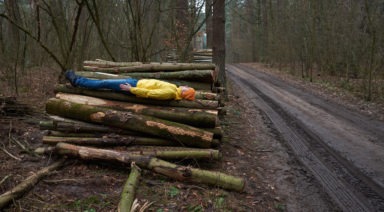Survivalism 101

The practice of “prepping” is growing: the resurgence of the DIY movement among millennials and apocalyptic preparation among the super-rich are indicators of this trend. The tech elite is buying islands and stocking them with food, renewable energy systems, and ammunitions; hedge fund managers are purchasing land in remote areas and building independent infrastructure. According to the New Yorker, survivalism has “expanded to more affluent quarters, taking root in Silicon Valley and New York City.”
What are People Preparing For?
An environmental cataclysm, prophetic apocalypses, failure of the energy grid, collapse of agricultural systems, viral outbreaks, the collapse of the financial market and overall economy, fascist regime takeovers, the list continues to grow. Survivalism has a long history: in 1961, President Kennedy called for Americans to build bombs or fallout shelters due to Cold War fears. Long before that, survivalism was the normal way of life.
Drivers of Survivalism
While largely driven by fear and independence, this movement is also driven by an interest in sustainable and off-grid living. Though a traditional survivalist future mirrors a scene in Mad Max or Cormac McCarthy’s The Road, the so-called “Thrivalist” movement grounds survivalism in collaboration, sustainability, and community.
Assignment: Catalog Your Dependencies
From the moment you wake up, you are dependent on systems and materials, from the electrical grid to the food supply chain. If you wear glasses, have a significant food allergies, drive to work on a road, or purchase groceries in a store, then you are reliant. When you are reliant, you are not independent, and thus, less likely to survive on your own.
Each day, take note in a journal of all the systems and materials that you rely on. Consider the things you need to live versus the things that you choose to use.

Survivalism 101
Grow your innate survival abilities and watch your sleep improve and your worries lessen. Often your greatest fears become your greatest strengths; consider teaching others as you hone your skills. Here are a few ways to establish your independence.
Grow Your Own Food
Learn how to grow your own food. Also, learn how to store, pickle and dry food. Learn how to cook with minimal ingredients. Consider growing medicinal plants and learning the edible and medicinal plants that naturally grow in your local environment. When you grow your own food pre-apocalypse, you may even save $24,000 per year. Composting skills are also extremely valuable, especially if biomass energy is generated.
Know the Rhythms of the Earth
Read about the cycles of the sun and moon. Document eclipses, astronomical changes and learn to navigate by the stars. Master navigators were often the explorers and elders of ancient civilization, revered for their understanding of earth systems. Now a lost art, some cultures still use “Old World” navigation: Polynesian’s are still considered genius navigators and use ancient techniques to travel the ocean by canoe.
Learn to Hunt, Fish and Raise Livestock
Learning to hunt, fish and raise livestock are invaluable skills. Hunting and fishing may involve various weapons or trapping techniques. The Boulder Outdoor Survival School teaches three basic hunting strategies; the strategies are based on the tactics used by animals, such as canine (chase/pack hunting), feline (spot and stalk) and raptor (ambush). Urban agriculture programs are surfacing all around the world, which supports efforts to raise chickens, rabbits or even apiary endeavors. Explore the urban agriculture policies of your local government.
Green Your Energy Supply
While your first step is to measure and lower your energy use, you may also invest in renewable and alternative energy sources. Invest in solar panels, a generator, wind turbines and property with geothermal energy. Tesla’s solar shingles are inspiring new home designs: consider following the work of energy progressive’s like Tesla and the Rocky Mountain Institute.
Find Independent Health
Learn how to heal yourself. How to take care of yourself. If you are dependent on medicine, find a natural remedy you can grow. If you need glasses, consider getting laser eye surgery. Steve Huffman, CEO and Founder of Reddit and survivalist, got laser eye surgery so he would no longer be dependent on his contact lenses or glasses. If you have allergies, explore immune-building tactics you can take to increase your tolerance.
Get Skilled
Take technology, engineering or construction classes. Learn how things work, how to take them apart and put them together. In large part, survival skills involve understanding nature and learning how to use natural materials and processes to survive. Take survivalist courses: learn how to build a snow cave and start a fire without matches. Here are some other training courses to consider:
- Basic medical training, including CPR
- Herbology and gardening
- Electrical training, such as how to repair a radio
- Machinery maintenance
- Chemistry (think Matt Damon in The Martian)
- Cartography and map reading
- Survival training in different environments, such as urban or rural
- Archery
- DIY anything
Draft a Communication Plan
Establish a meeting place or signal system with loved ones. FEMA provides guidelines for emergency preparation, including organization of identification and financial documents. However, in the event that government emergency services are not operating, consider drafting a basic plan on where and when to congregate with family members, on high ground and at a certain time driven by nature, such as sunrise.
Honor Native Wisdom
Throughout history, many indigenous cultures have lived in harmony with the planet, with respect for nature, animals and the cycles of the planets. Learn about indigenous cultures in your area: how they handled weather extremes, the plants they ate and used, and how they built shelter. These practices were refined over centuries and offer ingenious survival tricks.
Find Allies
The “lone wolf” survival strategy is only one approach to survivalism. According to Gregg Braden, cooperation, not competition, is the most successful evolutionary driver and thus, adaptation strategy. Create a network, understand each other’s strengths and weakness, work together to create and implement solutions.
Play Defense
Learn how to defend yourself. For some this may mean stockpiling ammunition, but considering that is not a sustainable tactic, try learning martial arts, archery or basic defense strategy. Placement of a shelter, on high ground and with a bird’s eye view, is an example of a tactical defense strategy.
Dream of Contributionism
The principles of Ubuntu may seem idealistic, but a survivalist future based on contributionism is certainly possible. To prepare, develop a craft people will need and appreciate. For example, learn to grow strawberries for a world wanting sweetness or knit wool hats for cold winters. Consider your personal strengths and leverage them.
Practice
It may seem counterintuitive, but survivalism requires practice. Embody a mindset of sustainability and independence. Set aside time each year to test and advance your survival skills. Try a survival field course: you can find courses and schools that offer urban or wilderness survival training. Eventually you may even consider living off the grid full time.
New Zealand Gives Maori Volcano Human Rights

In a move to honor its indigenous people and provide retribution for colonialist oppression, New Zealand is giving human rights to a Māori volcano on the country’s North Island. Mount Taranaki will now be afforded all the legal rights of a person and is the country’s third natural feature to be given this designation.
After Lonely Planet – the largest travel guide publisher in the world – named Mount Taranaki the second-best location to visit, officials in New Zealand decided to protect the dormant volcano in a way that honored their native people. The mountain’s entitlement comes after the country gave the same human rights protection to the Whanganui River earlier in 2017.
Mount Taranaki is a 120,000-year-old volcano that is New Zealand’s most frequently hiked mountain. Its new designation would make punishment for anyone who harms the mountain tantamount to harming a member of the Māori people. The local tribes will work in conjunction with New Zealand government to maintain the sacred feature and ensure its protection.

Māori natives hold the volcano to the same esteem as one of their own family members, or whanau, and consider it to be an ancestor. In Māori philosophy, humans are considered to be part of the universe and, rather than domineering the natural world, they consider humanity to be an extension of it like any other feature.
This seems to mirror the ideas of shamanism and many indigenous tribes whose spirituality and religion is based on the ideology of animism, the belief that all material things have a spirit. It is common for indigenous tribes and shamans to explain that all they know about our world came from conversations with plants, trees, and nature.
In western society, we give human rights to corporations in much the same way. Corporate personhood gives these entities names, legal rights, and the ability to spend money in political campaigns, all while remaining entirely separate from the individuals who work there. If we think this makes sense to provide privileges to what is essentially an immaterial concept, then it makes perfect sense that natural features should be given personhood with legal protections.
New Zealand is setting a precedent for the world to follow, and it’s doing it while acknowledging to its indigenous people that imperialism from the 19th century demands retribution. The act is part of an apology particularly for the British Crown’s lack of enforcement of the Treaty of Waitangi – a pact between the Māori and British government originally intended to protect native rights.
Could New Zealand’s example lead to similar actions in other nations with histories of oppression against native people? In the U.S. reparations are rarely made to Native American groups, while indigenous land and protections continue to diminish.




































